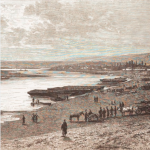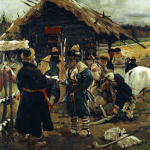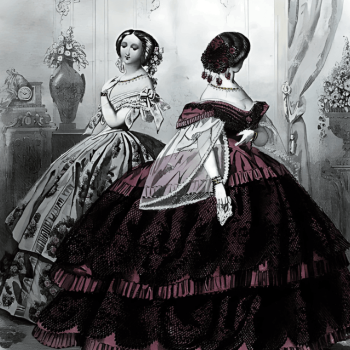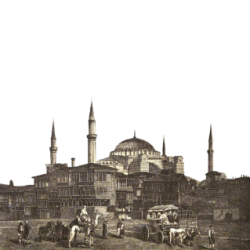RUSALKA
In 1832, a year after deployment, Pyotr Alekseevich returned to Helena Andreevna in Ekaterinoslav, where he met the infant Lelya for the first time. Not long after his return, Helena Andreevna was pregnant once again, giving birth to a son named Alexander, or “Sasha” to friends and family. Marriage for a girl in these years, even under the best of circumstances, was still a lottery. “It will work out well, but if it does not work out, walk all your life as if nothing bothers you,” was the thought. If Helena Andreevna’s prophetic dreams were a prediction for her own happiness at the altar, then she was deceived by her own dreams. To be sure, Helena Andreevna was the heroine of a story—it just wasn’t a love story. Due to the strength of her soul, the high aspirations of her mind, and the subtle impressions of her extremely delicate, receptive nature, Helena Andreevna could not be completely happy with Pyotr Alekseevich, a man, though honest and kind, was too positive and calculating, and devoted only to matters practical and earthly. He was too “of this world” for her, too prosaic, and she could not share with him her inspirations, nor her feelings and thoughts. She, no doubt, could have made a much more brilliant match if she had not lived in the outback and had not been married so soon after childhood.”
At the end of 1833 Pyotr Alekseevich was transferred to a town in the Kiev Province. The battery did not remain in the new location for long. From then on, both the battery and the Hahn family (which followed it like a blind man following a leader,) exchanged its sedentary character for the life bivouac, migrating from town to town, from one Province to another. At first, everything in the new life was attractive with its novelty—the place, the atmosphere, and the attitude of the people. “It’s good to roam hand in hand with love,” thought Helena Andreevna, “but if love is not there?” The transient life made it difficult to form meaningful relationships with people, and nearly impossible to maintain connections with so many new superficial acquaintances. Surrounded by a company of idle officers (with their “flat jokes” and tobacco smoke,) everything was inappropriate for her, accustomed from childhood to work, to communicate with developed people. She realized that she had to retreat within herself, and carefully hide her thoughts and interests from others. “I lived in the world as if in a desert where only stones and passing clouds are my witnesses,” she thought. “I live under the influence of my own self-respect and the example of my mother. Other people’s opinions are a mirage that would not cool anyone, not quench anyone’s thirst.”
Helena Andreevna distracted herself from spiritual loneliness and the banality of life by focusing all of her love and attention on children—and there were plenty of distractions with Lelya. When she was quite a baby, Lelya wished very much to examine a picture that was hanging high up on a wall and covered by a white curtain. She asked someone to uncover the picture, but her request was not granted. Later on, when she was left alone in the room, she pushed a table to the wall and put another small table over, and then a chair over this again, and succeeded in climbing to the top of the furniture tower with one hand grasping to the dusty wall, and with the other reaching out to the curtain. She lost her balance and remembered nothing else except a hazy recollection of a white-robed man. Coming to, Lelya found herself lying on the floor safe and sound. The tables and the chair were in their usual places, the curtain drawn over the picture, and the only proof of all this having occurred was a little handprint on the dusty wall under the picture.[1]
Children with Lelya’s birthday, that is, born during the night between July 30, and July 31, were said to possess magical powers, and a mystical destiny before them. This was why the Serfs and village folk called her “Sedmitchka,” or “Seventhling,” that is, one connected with the number seven (July being the seventh month of the year.)[2]
Lelya was raised in an atmosphere saturated with those possessed with a firm belief in the existence of an invisible world of spirits (and other beings inextricably blended with the life of each mortal.) For Lelya, the “Domovoy” (house spirit) was no fiction any more than her nurses and Russian maids, he was her friend. These sprites were like little old men, but no bigger than a five-year-old boy but flew into a passionate fit if his surroundings were untidy, or not to his liking.[3] Domovoy’s were attached to every house and building, and watched over the sleeping household at night, keeping quiet, and working hard the entire year for the family, cleaning the horses each night, and protecting the cattle from witches (with whom he has an eternal feud.) The Domovoy was only to be feared only on March 30, when, owing to some mysterious reason, he became a menace to the household. (Only “seventhlings” were exempt from his freaks.)
There was, in fact, a certain ceremony performed in great secrecy on July 30, which the nurses in the household divulged to Lelya as soon as her consciousness could realize the importance of the initiation. She learned even why, on her birthday, she was carried about in her nurse’s arms around the house, stables, and cow-pen, and made to personally sprinkle the four corners with water (the nurse all the while repeating mystic incantations.) Born in the very heart of the country that the Rusalka (mermaids) had chosen for their home since time immemorial and reared on the shores of the Dnieper River (where not even the Cossacks of Southern Ukraine crossed without preparing for death) Lelya’s belief in those green-haired nymphs was developed before she conceived of anything else. The sandy shores of the rapid Dnieper (which encircled Ekaterinoslav) was her favorite rambling place, for there she saw a rusalka in every willow tree, smiling and beckoning to her. Full of her own invulnerability (impressed upon her mind by her nurses,) Lelya was the only one who approached those shores fearless and daring. Lelya certainly felt her superiority, and she abused it marvelously. The little four-year-old girl demanded that her will should be implicitly recognized by her nurse, “lest she should escape from her side, and thus leave her unprotected, to be tickled to death by the beautiful and wicked rusalka, who would no longer be restrained by the presence of one whom she dared not approach.” Of course, neither Helena Andreevna nor Pyotr Alekseevich knew anything of this side of the education of their eldest child, (and learned it too late to allow such beliefs to be eradicated from her mind.)
During one of her walks by the riverside, a teenage boy began dragging Lelya’s carriage. This naturally incurred her displeasure.
“I will have you tickled to death by a rusalka!” screamed Lelya. “There’s one coming down from that tree…here she comes…See, see!”
Whether the boy saw the nymph or not was never learned, he took to his heels, disappearing along the sandy banks which lead to his home. After much grumbling, Lelya’s old nurse was constrained to return home alone with her charge, determined to have the boy punished. The poor lad, however, was never seen alive again, as his body was found several weeks later by some fishermen who caught him in their nets. The verdict of the police was that it was an accidental drowning, but the verdict of the nurses and servants in the horrified household was the death occurred because Lelya withdrew her mighty protection from the lad, thus delivering the victim to some rusalka.
Helena Andreevna and Pyotr Alekseevich were not pleased with this foolish gossip and were even less pleased to discover that said gossip was enhanced by the supposed culprit gravely corroborating the charge.
“It was I who handed over this disobedient serf to my faithful servants the water-nymphs,” Lelya declared.
It was only after this tragic event (one that would have otherwise passed without notice by the family,) that a foreign governess, one without superstition, was considered for Lelya.[4]
-
- NOVOROSSIYA
- The Arbiter Of Europe’s Destiny.
- The House Dolgorukuy
- Madame Krüdener
- Ekaterinoslav
- The Arabat Arrow
- The Mystery Of General Inzov
- The Doukhobors
- Pushkin
- Chuguev Military Settlement
- “The Blessed”
- The Decembrists
- Penza
- Independence
- Last Words Of Samuel Khristianovich Kontenius
- “Amid Coffins And Desolation”
- Rusalka
- Dead Souls
- Secret Passages
- Astrakhan
- Nevsky Prospekt
- Kalmyk Ulus
- Love And Ambition
- Duellistes
- Pyatigorsk
- A Heroine Of Our Time
- Winter Palace
- Zeneida R-Va
- Steppes
- Letter To Natalya
- Fire And Ice
SOURCES:
[1] Pissareva, Helena Fedorovna. “Helena Petrovna Blavatsky.” The Theosophist. Vol. XXXIV, No. 4 (January 1913): 495-506.
[2] Sinnett, Alfred Percy. Incidents In The Life of Madame Blavatsky. G. Redway. London, England. (1886): 20-24.
[3] Stevens, Thomas. Through Russia On A Mustang. Cassell Publishing Company. New York, New York. (1891): 293.
[4] Sinnett, Alfred Percy. Incidents In The Life of Madame Blavatsky. G. Redway. London, England. (1886): 20-24.













